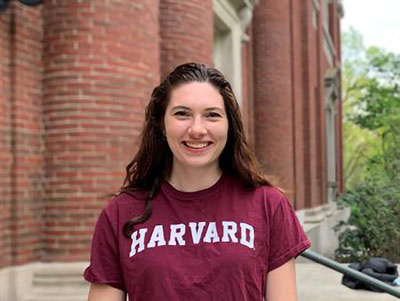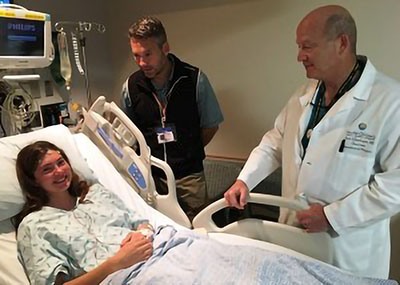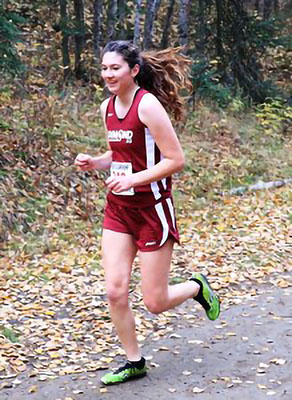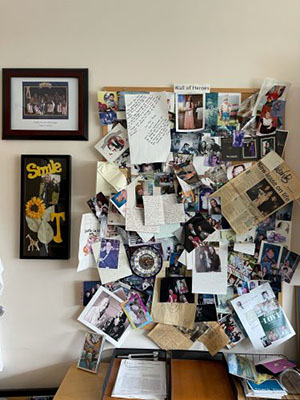Five Years After Her Brain Tumor Surgery, Liesel Is Graduating From Harvard
5.10.2021 | Joy Jernigan
 As a high school freshman, Liesel Von Imhof had a dream of attending college at Harvard. She packed her schedule with challenging classes and participated in varsity sports such as cross-country running and cross-country skiing. She had occasional, debilitating headaches that sometimes caused her to miss school, but she blamed them on stress, dehydration or low blood sugar.
As a high school freshman, Liesel Von Imhof had a dream of attending college at Harvard. She packed her schedule with challenging classes and participated in varsity sports such as cross-country running and cross-country skiing. She had occasional, debilitating headaches that sometimes caused her to miss school, but she blamed them on stress, dehydration or low blood sugar.
In July 2016, just before her senior year of high school, Liesel’s dream of Harvard was almost derailed when doctors found the reason for her headaches: a Ping-Pong ball-sized tumor in the middle of her brain.
At the urging of her doctors, Liesel, then age 17, and her parents traveled from their home in Anchorage, Alaska, to Seattle Children’s.
Thanks to the care she received here, the support of her family and friends, and her own determination, Liesel is graduating from Harvard this month with a degree in stem cell biology — her first step toward a career in medicine.
Neurosurgery “Dream Team”
 Doctors diagnosed Liesel with a pilocytic astrocytoma tumor, which was causing a buildup of cerebrospinal fluid in her brain and leading to significant swelling, a condition known as hydrocephalus. Left untreated, the condition could be life threatening.
Doctors diagnosed Liesel with a pilocytic astrocytoma tumor, which was causing a buildup of cerebrospinal fluid in her brain and leading to significant swelling, a condition known as hydrocephalus. Left untreated, the condition could be life threatening.
As she prepared for surgery, Liesel agreed to participate in a Tumor Paint clinical trial led by Children’s oncologist Dr. Sarah Leary. Tumor Paint aims to improve surgical outcomes by acting as a molecular flashlight, assisting neurosurgeons in distinguishing tumor tissue from normal brain tissue. Her surgeons, Drs. Amy Lee and Rich Ellenbogen, removed the tumor in a seven-hour surgery.
“We call them the dream team,” Von Imhof said. “When I was in the hospital before surgery, I was just kind of terrified and I didn’t really know what to expect. Dr. Ellenbogen took time out of his day to come visit me. He assured me, ‘Hey, I’ve seen this type of tumor before. Everything looks good. I feel really confident about this.’ ”
Seattle Children’s Brain Tumor Program is among the busiest in the nation, with survival rates for brain tumors that have been higher than the national average for more than 20 years.
“When a child walks through our doors, they’re not meeting just one neurosurgeon,” said Lee. “They are taken care of by an entire team. We have expertise in all aspects of a child’s care — pathology, neuroradiology, oncology, neurosurgery. Every bit of that expertise is needed to ensure that child has the best outcome.”
After surgery, Liesel learned her tumor was benign.
Her mother, Natasha, expected that her daughter would need to take time away from school to recover and postpone applying to college. She discussed her concerns with Liesel’s care team, who told her they were confident Liesel could return to school in August. They had no concerns about Liesel’s academic schedule.
“They gave me the hope I needed right when I needed it, and I will forever be grateful,” she said.
A Two-Year Recovery
 Less than a month after surgery, Liesel started her senior year of high school. She was so determined to be valedictorian that she made her mom a presentation detailing the reasons she should be allowed to take four Advanced Placement (AP) classes her senior year. Both her mom and her counselor allowed her to continue with her challenging schedule, with one free period of the middle of the day to rest her brain.
Less than a month after surgery, Liesel started her senior year of high school. She was so determined to be valedictorian that she made her mom a presentation detailing the reasons she should be allowed to take four Advanced Placement (AP) classes her senior year. Both her mom and her counselor allowed her to continue with her challenging schedule, with one free period of the middle of the day to rest her brain.
As she recovered, Liesel struggled with her short-term memory. Ellenbogen advised her to write things down, so her mom bought a white board for the kitchen. Liesel meticulously jotted down her homework at the end of every class. Her parents hired a math tutor. In her free time, she baked, worked on puzzles and played the violin. When she was cleared to exercise again, she returned to the cross-country team and ran the last race of the season.
Liesel applied to Harvard in October. In December, she received an email informing her she had been accepted into the class of 2021.
Ellenbogen had told Liesel that her recovery may take up to two years.
“Every year I feel like, ‘Oh, now I’m really back to normal and this is the new me,’” Von Imhof said. “And then every year, I somehow go slightly over that and reach a new height.”
In her second semester of her senior year, Liesel earned straight As. She participated in the cross-country skiing team and finished high school as valedictorian.
Life at Harvard
 One year after surgery, Liesel began her freshman year at Harvard. She jumped into college life, living in campus housing and meeting new people. She walked onto the rowing team her freshman year and later joined a social club. When she’s struggling with a challenging class, she hires a tutor. To stay in shape, she enjoys running, hiking and roller skiing, which she describes as “like cross-country skiing on wheels.”
One year after surgery, Liesel began her freshman year at Harvard. She jumped into college life, living in campus housing and meeting new people. She walked onto the rowing team her freshman year and later joined a social club. When she’s struggling with a challenging class, she hires a tutor. To stay in shape, she enjoys running, hiking and roller skiing, which she describes as “like cross-country skiing on wheels.”
Due to the COVID-19 pandemic, most of Liesel’s classes have been virtual for the past year. She works part time in a cancer research lab, studying zebrafish that have neuroblastoma tumors with a fluorescent expression that makes the tumor glow. Her job is to image the size of the tumor with a microscope and compare before and after images to see whether investigational drugs affect the size of the tumor. The work reminds her of her experience with the Tumor Paint clinical trial. The science is not the same, she said, but “it’s the same theme of visualizing a tumor and the important information that can tell you.”
Liesel, who will turn 22 years old this month, hopes to continue working in the research lab through the summer. She is interested in targeted genetic medicine, where she said “the future of medicine is heading.” She wants to take a year off and then apply to medical school.
Harvard is hosting a virtual graduation this year, but Liesel’s family plans to fly in to support her.
“Wall of Heroes”
In his office, Ellenbogen has a “Wall of Heroes” where he keeps photos and letters from patients like Liesel. For almost 25 years, he’s followed the progress of his patients through life’s milestones. Some now have children of their own and have sent him photos of their babies. He plans to add Liesel’s Harvard graduation photo to this wall.
“That’s what inspires me,” he said. “I stay in touch with them. I ask my patients every year on the anniversary of their operation to write me and tell me how they’re doing. It’s what makes me get up every morning and feel good about what I do.”